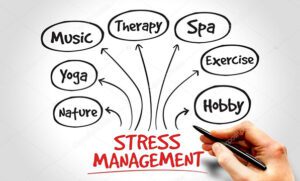Hypnotherapy for Stress Management – What is it and How Will it Help Me?

Stress management therapy teaches you a number of useful techniques to help reduce the stress in your life. Many of the methods you will learn are able to be used wherever and wherever they are needed. You will learn simple anchors, such as squeezing 2 fingers together, which will trigger a calm, relaxed, emotionally intelligent response to stress. You can also learn ways of reframing your stress, so you can see it a bit differently and it ends up being not quite as devastating as you thought it was.
Stress Busting Tools - Stress Management Skills & Techniques
 The stress management tools you will learn will teach you how to manage stress. They are simple and effective. To begin with we get to know what your stress actually feels like to you. When you understand what it feels like, you will be able to calm yourself and deal with the stressful situation more easily. Also, we will get to understand what your personal stressors are. Knowing what causes you stress means you can prepare for it and then deal with it better.
The stress management tools you will learn will teach you how to manage stress. They are simple and effective. To begin with we get to know what your stress actually feels like to you. When you understand what it feels like, you will be able to calm yourself and deal with the stressful situation more easily. Also, we will get to understand what your personal stressors are. Knowing what causes you stress means you can prepare for it and then deal with it better.
De-stressing Methods That You Can Use Anywhere
Many of the stress management techniques you learn can be used exactly when you need them. That is as long as it is safe to do so. For example, we would recommend destressing before or after a car journey and not while you are actually driving. They are all designed to be good ways of you controlling your stress response as opposed to the stress controlling you.
NLP Anchoring of Calm Collected Emotional Intelligence
 Using hypnotherapy and NLP (Neuro Linguistic Programming) you will be able to anchor the positive, calm, relaxing feeling you want. Your anchor could be simply squeezing a finger and thumb together to trigger calm feelings. You can then use this anchor before, during and after a stressful situation. This makes you more emotionally intelligent and much better at coping with anything life throws at you.
Using hypnotherapy and NLP (Neuro Linguistic Programming) you will be able to anchor the positive, calm, relaxing feeling you want. Your anchor could be simply squeezing a finger and thumb together to trigger calm feelings. You can then use this anchor before, during and after a stressful situation. This makes you more emotionally intelligent and much better at coping with anything life throws at you.
Wouldn’t you prefer a more emotionally intelligent and collected response to a threat? That perceived threat might be the boss blowing their top at you or, thinking you don’t have enough time to do something (mowing the lawn) or perhaps feeling like your finances are out of control. These all cause stress. It is far better in these or any other situation to deal with it calmly. So, we teach you how to manage stress better.
 CBT (Cognitive Behavioural Therapy) Reframing – See it Differently
CBT (Cognitive Behavioural Therapy) Reframing – See it Differently
You will also learn C.B.T. (Cognitive Behaviour Therapy) based reframing techniques to help you see your stress a bit differently. Stress will always be there, it cant be simply removed. Originally the flight, freeze, flight (fff) stress response was there for a good reason. A long time ago it happened when you saw a wolf or tiger come out from the jungle close to you. So it was useful to you and in the right circumstances it still is today.
Reframing your thoughts and responses can also take place when you become aware of your stress and stressor. You have learned to be more aware of it so lets do something about it.
- Feel, see or notice your thoughts during a stressful situation.
- (e.g. “Oh no! I don’t have enough time to prepare dinner! The entire family will starve!”)
- Automatic negative thoughts cause stress!
- Now you have noticed you are stressed, calm down taking a few deep breaths.
- Challenge those negative thoughts.
- (e.g. Do I really not have enough time? Will they actually starve?)
- Change those negative thought into something more positive.
- (e.g. I can make something simple like a salad or beans on toast tonight. It will only take 15 minutes.)

 CBT (Cognitive Behavioural Therapy) Reframing – See it Differently
CBT (Cognitive Behavioural Therapy) Reframing – See it Differently
I am stressed at the moment and found this. Thanks it has opened my eyes a bit now. With your stress busting tools as you put it, how do I get to know what my stress feels like? Thanks Greg.
Hi Greg, Thank you for what is a good question. We will look into the history of your stress. We find out what your stressors are, where it comes from and what triggers stress for you. Then if required and with your permission, we can discuss a recent stressful event. This allows us to find out what it actually feels like to you and understand where in your body those sensations are happening. This then gives you detail of what triggers your stress and what to watch out for when it is sneaking up on you. Not easy to explain but, if you were to feel a knot in your tummy when you are stressed. Then using a relaxation technique when you feel this starting to happen should help you. Basicaly, the better we can understand your personal stress, the better we are able to find solutions to it that work for you as an individual. If you would like to book in please feel free to use Intake Form which incidentally will allow you to understand your stress more as you go through filling it out. I look forward to hearing from you. All the best, Kevin